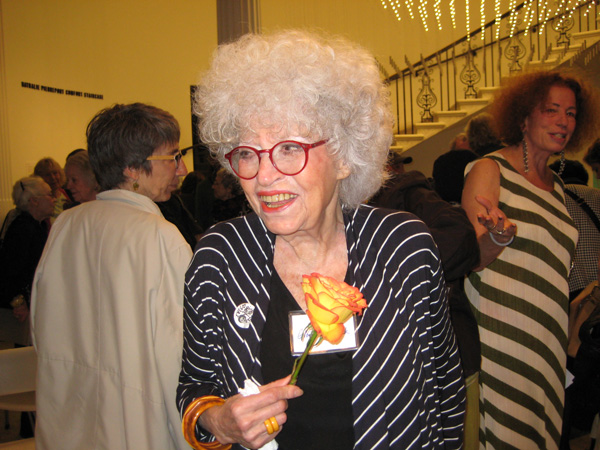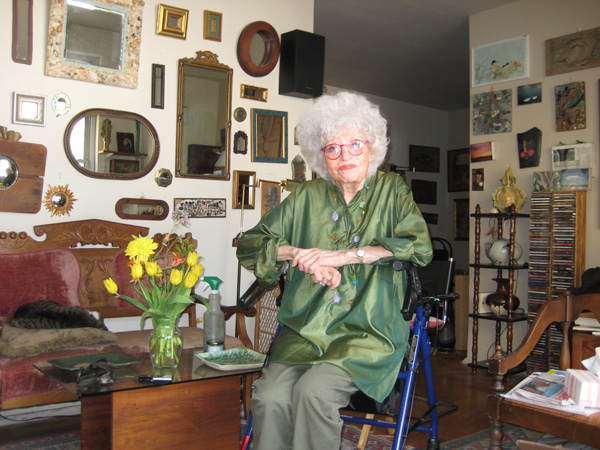BY DUSICA SUE MALESEVIC | Gloria Sukenick remembers how her housing activism began — with Barneys.

It was the ’80s and Barneys was eyeing expansion on Seventh Ave. and W. 17th St. in order to open a women’s store. It had started as a discount store, but had transitioned to the high-end mecca that is known today.
“However, there were families that had been living there for years — they were all rent stabilized or rent controlled,” Sukenick told Chelsea Now at her Penn South apartment. “They were all very affordable rents and Barneys was intent on getting them out of there.”
So Sukenick, famed housing activist Jane Wood and the Chelsea Coalition of Housing went to battle.
“We fought it in the most astounding ways,” she said.
Sukenick, who turned 90 in April, recalled how they would have one-minute street theater in the middle of Seventh Ave. The night of store’s opening, their performance art protest reached its apex.
“We had decided that we were going to have this fashion show, so we rented a limousine and we all dressed up in wacky costumes,” she said.
She wore a jumpsuit that she had pinned large one dollar bills on — with the words “Barneys Bill of Rights” emblazoned on them.
Barneys got its space, but in the end the housing activists scored a victory: the displaced tenants were moved into Chelsea apartments with the same rents and protections.
Sukenick’s dedicated championing of housing rights was honored with a Clara Lemlich Award on May 4 at the Museum of the City of New York.
Marlena Vega, 9, and Lena Habtu, 10, introduced Sukenick. Both girls participate in a book club run by the museum, and became fascinated with the Triangle Shirtwaist Factory fire, and ended up interviewing Sukenick for their speech.
The award was started in 2011, coinciding with the 100th anniversary of the Triangle Shirtwaist Factory fire near Washington Square where 146 workers — mostly female immigrants — lost their lives. Lemlich inspired and led others to protest the conditions many workers were subjected to — spurring the uprising of 20,000 in 1909.
“We decided that in the spirit of Clara Lemlich, a very great woman activist, young immigrant girl, who fought for the rights of working women all her life — we were going to give an award every year to women activists in their 70s, 80s, 90s and 100s who are still fighting,” said Esther Cohen in a phone interview.
People are nominated from all the boroughs, explained Cohen, who is a member of the advisory boards of the Puffin Activist Gallery, LaborArts and Remember the Triangle Fire Coalition — all hosts of the awards, which is sponsored by the Puffin Foundation.
Judith Sokoloff, editor of the “Na’amat Woman Magazine,” said she nominated her good friend and role model Sukenick.
“She is one of those amazing people who’s still active politically, socially. She’s just a die hard life-long activist with a long, interesting history,” said Sokoloff, who also lives in Penn South, in a phone interview. “And I felt that she should be recognized for things she did, like work for tenant rights.”
After the Barneys expansion, Sukenick continued to work on housing issues. She had lived all over the city — mostly Downtown — before settling in Chelsea around the late ’70s, first on W. 21 St. between Sixth and Seventh Aves. and then in Penn South, where she has resided in the same apartment for around 22 years.
“I could see where rents were going and I could see already the squeeze on housing,” she said.
In the late ’70s, early ’80s, buildings were being held empty, she explained, so that a landlord could co-op it. Landlords would let vicious dogs loose in the hallways or install noisy tenants, she said.
The Chelsea Coalition of Housing, led by Wood, would take over empty buildings and move families in there, she said.
“We had these enormous demonstrations and all of Chelsea would come out. One phone call and she would have a line of people from Seventh to Eighth Ave.,” said Sukenick, referring to Wood, whom she described as a force.
After several years at the coalition, the Brooklyn native became part of the Metropolitan Council on Housing, working the phones for their hotline and volunteering at their drop-in center for tenants. She is still on the council’s advisory board, she said, but prefers to fight with words now — and is seen frequently on Chelsea Now’s Letters to the Editor page.
Sukenick tried her hand at many different jobs — waitressing, modeling and switchboard operator for the Museum of Modern Art — before she became a copywriter for Alexander’s, a department store chain, where she worked from her 30s until her retirement.
“I kind of ambled my way through till I got to my activist years,” she recalled. “I retired as soon as I possibly could at 62.”
When she first got out of Alexander’s, she said, there were many demonstrations, and she wanted to be a part of it. So she went to 47th St. and brought a drum, which she would take to protests.
“There’s nothing better than a drum to get people’s attention and get them starting to move and do something,” she said.
She also participated in the feminist movement, going to the Women’s Firehouse, where the New York Radical Feminists held their meetings, and to consciousness-raising groups.
“This was a wonderful new experience of closeness with other women,” she said. “At that point in time, it was a powerful force.”
While she still considers herself a feminist, she is more focused on housing issues and what is happening in Chelsea, which is “becoming a richer and richer community.”
Her apartment in Penn South is filled with fresh flowers and her artwork — mosaics and collages adorn the wall and bowls enhance tables. She is concerned about Penn South’s future and wishes she could see which way future votes about privatizing the complex would go.

“I find it such a wonderful thing that this place has kept not-for-profit and you can’t make money on it, you just have to give it back to the corporation,” she said. “That has let you live at a modest price so that someone else can afford to live here. Sounds so wacky, doesn’t it, in this culture?”


































